| Srl | Item |
| 1 |
ID:
179027
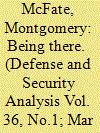

|
|
|
|
|
| Summary/Abstract |
This article argues that the US Navy’s roles (which have historically been bifurcated between warfighting and political use of force) manifest in its organisational culture as two different concepts of war: the US Navy as diplomatic actor and the US Navy as warfighting force. The conflict between these different concepts of war can be seen in the current debate about the definition and function of presence. The debate about presence is not just theoretical, but represents a deep and enduring conflict within the Navy as an organisation about its concept of war. Since the end of WWII, the Navy has been designing its fleet architecture according to a Mahanian concept of war, despite the preponderance of non-lethal missions and activities. The result is a mismatch between platforms and tasks.
|
|
|
|
|
|
|
|
|
|
|
|
|
|
|
|
| 2 |
ID:
188261
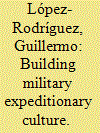

|
|
|
|
|
| Summary/Abstract |
This article analyses the Spanish experience in military operations abroad, studying the functions it carried out in order to demonstrate how expeditionary experience has shaped military change processes. Using a database built from the Spanish Army’s online missions register, as well as from 23 personal interviews conducted with Spanish servicemen, this research focuses on how the Spanish Army has changed through its overseas deployments and how its organisational culture has evolved. The results obtained show a tangible transformation, which has modified procedures, military equipment, and operational functions. There have also been intangible transformations, reflected in the mentality and awareness of military personnel, readying them for deployment anywhere and anytime.
|
|
|
|
|
|
|
|
|
|
|
|
|
|
|
|
| 3 |
ID:
085052


|
|
|
| 4 |
ID:
121148
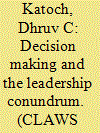

|
|
|
| 5 |
ID:
154725
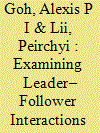

|
|
|
|
|
| Summary/Abstract |
This article proposes an exploration of language as a cultural voice in the research of leadership, and
the conception that the dyadic relationship between leader and follower can be further looked into
semiotically within the discourses of language. In particular, this research hopes to bring into view the
plausible relationship between Chinese politeness and leader–follower interactions as well as its impact
on followers’ career development. The appropriate (non)usage of second-person pronoun nín (您) by
followers while interacting with superiors is the exemplar vernacular examined in this article. We
engaged 32 eMBA students on the usage of this second-person polite pronoun in official organisation
settings. Many agreed that Chinese politeness is both expected and required by interlocutors involved,
and it is a form of ‘face-giving’ and an acknowledgement of hierarchical differences. In most Chinese
organisations, status and hierarchical positions are specified clearly and must be properly acknowledged
as linguistic politeness is both expected and required. The authors hope to raise the possibility that the
linguistic and cultural influences, particularly politeness, involved in face-to-face verbal interactions
within formal Chinese corporate environment may signal a possible discursive variation in leader–follower
communication studies.
|
|
|
|
|
|
|
|
|
|
|
|
|
|
|
|
| 6 |
ID:
139828
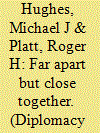

|
|
|
|
|
| Summary/Abstract |
A good deal has been written about the organisation and structure of the British diplomatic establishment since 1945. This analysis uses detailed quantitative and qualitative data to develop an understanding of the background and career trajectories of the most senior figures in the Diplomatic Service in 1975. By tracing their careers, it is possible to identify more precisely than before the changing educational and social background of these individuals when compared with previous generations of diplomats. This analysis also examines certain core features of the culture of the diplomatic establishment during the post-war decades, analysing how it both shaped and was shaped by particular structures and practices. Despite the existence of a peripatetic career structure that dispersed members of the diplomatic establishment around the globe, there were still numerous opportunities for the kinds of personal contact necessary to maintain an integrated culture.
|
|
|
|
|
|
|
|
|
|
|
|
|
|
|
|
| 7 |
ID:
164290
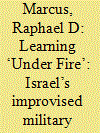

|
|
|
|
|
| Summary/Abstract |
What organisational attributes enhance a military’s ability to effectively adapt on the battlefield? Upon the outbreak of war in July 2014 between Israel and the Palestinian militant group Hamas, the Israel Defense Forces (IDF) encountered an expansive network of tunnels from which Hamas was launching large-scale assaults into Israel. This article illustrates that the IDF’s ability to successfully adapt ‘under fire’ to this battlefield surprise was facilitated by several important attributes related to its organisational learning capacity: a dynamic, action-oriented organisational culture, a flexible leadership and command style, specialised commando units which acted as ‘incubators’ for learning and innovation, and a formal system to institutionalise and disseminate lessons learned.
|
|
|
|
|
|
|
|
|
|
|
|
|
|
|
|
| 8 |
ID:
133258
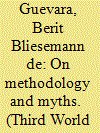

|
|
|
|
|
| Publication |
2014.
|
| Summary/Abstract |
Exploring the historiography of the International Crisis Group (icg), this article looks critically at the narratives surrounding the organisation's self-declared success. The focus is specifically on the so-called icg methodology, consisting of field-based research and analysis, practical policy recommendations and high-level advocacy. Combining a three-level approach to the analysis of organisational cultures with Yanow's concept of organisational myths, the article argues that the icg methodology contains a number of organisational myths that are meant to mask tensions and contradictions in the organisation's underpinning basic assumptions and values, which, if publicly discussed, could have the power to undermine its expert authority. The four myths looked at in detail are the 'field facts myth', the 'myth of flexible pragmatism', the 'myth of uniqueness' and the 'neutrality/independence myth'.
|
|
|
|
|
|
|
|
|
|
|
|
|
|
|
|
| 9 |
ID:
090541


|
|
|
|
|
| Publication |
2009.
|
| Summary/Abstract |
Both US intelligence officials and intelligence studies scholars claim that 'organizational culture' is a cause of 'intelligence failure' and the proper locus of post-9/11 intelligence reform efforts. This essay uses a postmodern perspective to demonstrate how the dominant discourse of 'organizational culture' shapes stakeholders' understandings of accountability and what constitutes necessary, correct, or effective intelligence reform. By exploring institutional struggles over the meanings of 'culture' and 'accountability', this essay calls for reconsideration of the ways US intelligence officials and intelligence studies scholars talk about 'organizational culture' vis-a-vis post-9/11 intelligence reform.
|
|
|
|
|
|
|
|
|
|
|
|
|
|
|
|